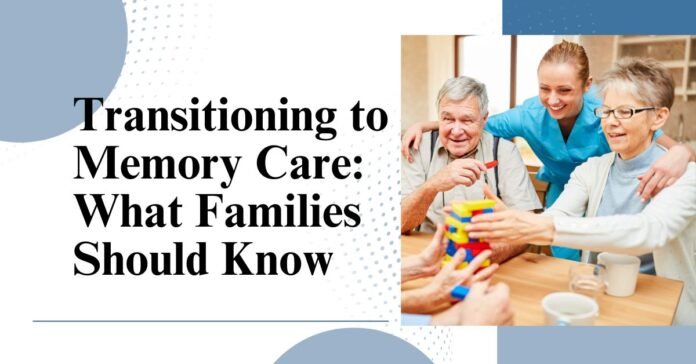Transitioning a loved one to memory care is never an easy decision. It’s emotional, often overwhelming, and can leave families questioning if it’s the right time. You may be facing signs of cognitive decline, like Alzheimer’s or dementia, and wondering how to ensure your loved one receives the care they need. Being informed about what to expect before, during, and after the move can help families make timely decisions that prioritize their loved one’s safety, comfort, and quality of life.
What Is Memory Care?
Memory care is a specialized type of long-term care designed specifically for individuals living with Alzheimer’s, dementia, or other memory-related conditions. It provides a safe, structured environment with trained staff who understand the unique challenges of memory loss. Memory care services are often offered within assisted living or skilled nursing communities, but there are also standalone memory care facilities. These spaces focus on enhancing quality of life through personalized care, daily routines, and cognitive-stimulating activities.
What Are the Signs It’s Time for Memory Care?
Safety Concerns
One of the most urgent indicators is the risk to your loved one’s safety. This includes wandering, forgetting to turn off the stove, falling frequently, or becoming lost in familiar surroundings. These behaviors can quickly escalate into dangerous situations. Memory care facilities are designed with safety featuring secured entries, monitored environments, and staff trained to prevent accidents ensuring a safer, more controlled setting for those with memory-related conditions.
Increasing Care Needs
As memory loss progresses, individuals often require help with basic activities such as bathing, dressing, eating, medication management or using the restroom. When these daily routines become too difficult for the individual and too demanding for the family caregiver. It may signal the need for full-time professional care. Memory care facilities provide 24/7 support tailored to each resident’s level of need, helping preserve dignity while reducing the risk of neglect or injury due to self-care difficulties.
Social Isolation
People with dementia or Alzheimer’s often withdraw from social activities, avoid conversations, or isolate themselves at home. This isolation can accelerate cognitive decline and contribute to depression or anxiety. Memory care communities offer structured social programs and cognitive-stimulating activities designed to foster interaction and emotional well-being. In a memory care setting, residents benefit from routine, companionship, and purposeful engagement, which are essential to maintaining a sense of connection and overall mental health.
Decline in Cognitive Function
Progressive memory loss, confusion with time or location, difficulty recognizing loved ones, and impaired judgment are signs of worsening cognitive decline. When these symptoms interfere with daily living or put your loved one at risk, professional memory care becomes essential. Facilities are structured to support memory retention through cognitive stimulation therapy, consistent routines, and safe, familiar settings, helping residents remain as independent as possible while addressing the progression of their condition.
Decline in Physical Health
Weight loss, poor hygiene, neglected medical appointments, or frequent illness can all be signs that your loved one is no longer managing their health effectively. These changes often go unnoticed until they become severe. In a memory care facility, regular meals, personal hygiene support, health monitoring, and on-site medical care are standard. With comprehensive support in place, residents often show improvement in physical well-being, helping to stabilize or slow the effects of declining health.
How Do You Tell a Loved One They Are Going to a Memory Care?
Telling a loved one they are moving to memory care is an emotional conversation that requires empathy and patience. Use clear, gentle language and avoid overwhelming them with too much information. Emphasize the positive aspects such as making new friends, joining activities they enjoy, and receiving more personalized care. Most importantly, reassure them that they are not being left behind; you’ll visit regularly and remain a big part of their life. If needed, involve a doctor or counselor to help guide the discussion with care and understanding.
Final Thought: Making the Transition with Confidence and Compassion
Transitioning to memory care is a big decision, one filled with emotion, questions, and uncertainty. But it’s also a step toward ensuring your loved one receives the specialized support, safety, and compassion they truly need. By recognizing the signs, preparing thoughtfully, and staying involved throughout the journey, you’re giving them the best possible chance at a better quality of life. Remember, you’re not alone. With the right care and guidance, this transition can be a positive new chapter for your entire family.
If you notice any of these signs in your loved one, it’s advisable to reach out to a memory care center promptly. Memory care facilities can enhance quality of life and provide a secure environment for your aging loved ones. If you’re in Plano or a nearby area, take the time to research memory care facility in Plano or in your area, visit them in person, and ask questions about their philosophy of care, staff training, and amenities. By choosing the right memory care service for your loved one, you can provide them with the support and assistance they need to live their best possible life despite the challenges of memory loss.



